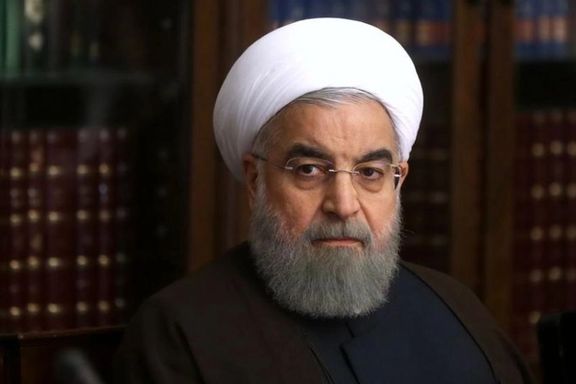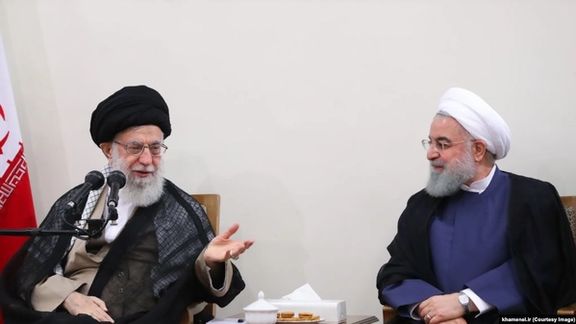Khamenei Rejected Rouhani’s Offer Of Resignation In 2018, Insider Says

A leading regime insider says former President Hassan Rouhani wanted to resign after the US pull-out from the 2015 nuclear deal, but the Supreme Leader refused.

A leading regime insider says former President Hassan Rouhani wanted to resign after the US pull-out from the 2015 nuclear deal, but the Supreme Leader refused.
Hassan Marashi, the secretary general of the centrist Executives of Construction Party told the economic website Eghtesad News on Tuesday that Rouhani should have resigned as his government was formed based on the idea of holding a dialogue with the United States, but Iran's foreign policy needed to change track in 2018 after Donald Trump left the JCPOA.
"When diplomacy failed, there was no reason for Iran continuing diplomacy," Marashi said. Meanwhile,Marashi acknowledged that the pull-out by Trump was a hard blow to the Rouhani administration. It also emboldened Rouhani's political rivals to start attacking him.
"I told the Supreme Leader that we needed to change course after Trump's pull-out, and then I heard that Rouhani had suggested that he should resign, but the leader did not deem the decision fit for the situation," Marashi added.

In another development, while Rouhani's hardliners have been demanding to put him on trial for his failure to sort out the country's economic and foreign relations problems during his presidency, another reformist figure has suggested that he should welcome a trial.
"I would have welcomed the trial if I were him, " said Mohammad Ali Abtahi the chief of staff of former President Mohammad Khatami in an interview with the Iranian Labour News Agency ILNA on Tuesday, adding that the call for Rouhani's trial is a blame game to divert attention from the new government's failure in solving the country's economic problems.
Abtahi added that the lawmakers who found their way to the parliament with revolutionary slogans have not been able to bring about any positive change and the economic crisis has been deepening on daily basis during the past six months.
"They have also not managed to solve the problem the issue of nuclear negotiations and the markets are still waiting for a positive sign from Vienna, and this is against the Majles and the administration's claims about separating the fate of the country's economy from what happens in the course of the negotiations,” Abtahi argued.
Speaking of responsibility about the current situation addressed both to President Rouhani and former Parliament Speaker Ali Larijani, former government spokesman Ali Rabiei, who is a swell informed veteran intelligence ministry official, summarized what Iran's hardliners call "the current situation"in his Telegram Channel and on the proreform Fararu news website.
Rabiei highlighted Iran's current situation as "the undesirable situation of economic hardships that make life difficult for decent Iranians, an unprecedented inflation worsened by the instability of Iran’s currency and other markets since 2018, widespread poverty that defies all the revolutionary slogans, the social fatigue and insecurity felt by various walks of life in Iran, a rise in emigration by elite Iranians, as well as a decline in respect for revolutionary values."
Rabiei also pointed out that decline in political participation is so bad “that in a city such as Tehran only around 7 percent of eligible voters went to the polls in the 2020 parliamentary election and in some cities the number of votes cast for the winner was barely higher than the number of those who worked at the polling station."
"Add to that the loss of Iran's geopolitical advantage, having no place in the international economy and depriving the nation of the opportunities international economy and modern technology can offer," Rabiei stressed.